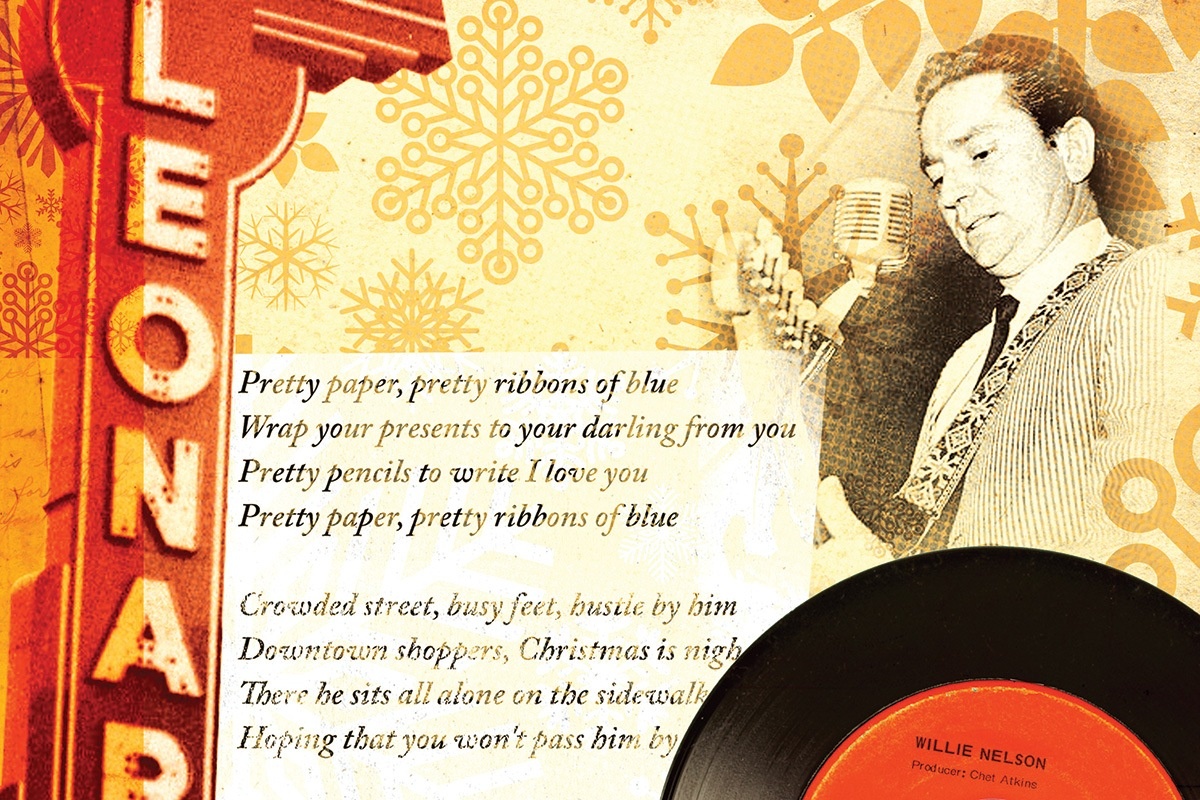Few Christmas standards have been written by Texas songwriters. Gene Autry from Tioga wrote Here Comes Santa Claus. Charles Brown from Texas City wrote Please Come Home for Christmas. And Willie Nelson from Abbott wrote Pretty Paper.
In his autobiography, It’s a Long Story: My Life, Nelson recalled how he wrote Pretty Paper. “Couple of months before Christmas. I was walking around, just looking over my land when my mind went back to someone I hadn’t thought about for years: a man without legs who sold pencils and what he called pretty paper in front of Leonard’s Department Store in Fort Worth. By pretty paper he meant wrapping paper. He had a way of crying out those words—‘pretty paper, pretty paper’—that broke my heart.
“I can’t tell you why, in October of 1963 I had this sudden and vivid memory. But it was so powerful that I picked up my guitar and set the story to music. I cast it as a Christmas scene, thinking that would heighten the drama.”
Nelson took the song to Fred Foster of Monument Records. “I think it’s perfect for Roy Orbison,” Foster said. Nelson knew the music business. “As a songwriter, I’ve always wanted my songs covered by big stars.” In those days, Orbison was a much bigger recording artist than Nelson.
Foster said, “Roy’s in London right now, but I’ll play it for him over the phone. If he likes it, I’ll book studio time over there, and we’ll rush it out in time for the holiday season.”
Orbison loved Pretty Paper. He was touring with a local band named the Beatles opening for him. Foster booked the studio, and Orbison cut the song in one take with English studio musicians.
Released in November 1963, Pretty Paper reached No. 15 on the Billboard Hot 100 chart. It hit No. 6 on the UK charts. Orbison included it in The All-Time Greatest Hits of Roy Orbison. Nelson recorded his own version as an RCA single in 1964 and then recorded a new version on his holiday album Pretty Paper, released in 1979. Rolling Stone has ranked Nelson’s Pretty Paper album the 11th-best Christmas LP of all time.
In December 2017, Bud Kennedy, a columnist with the Fort Worth Star-Telegram, confirmed the identity of the man who inspired the song. Kennedy had written articles about the song starting in 2004. Readers who shopped at Leonard’s Department Store recalled the street vendor.
“We saw the man crept along on all fours outside of Leonard’s Department Store wearing clunky gloves and kneepads made from old tire tread,” one reader said. The man also wore a leather vest with a coin box sewn in back. But no one knew his name.
That is until Bob Neely, a rancher from Santo, read one of Kennedy’s articles and called the columnist. Neely told Kennedy about his former neighbor, Frankie Brierton.
“You could always hear him in town, dragging himself over the gravel street,” Neely said. Neely put Kennedy in touch with Brierton’s daughter, Lillian Compte of Conroe. Compte explained to Kennedy that her father had died in 1973 at age 74 and was buried in Mineral Wells.
“My father had his legs weakened as a child by spinal meningitis, and he could never walk,” Compte said. “He declined a wheelchair and preferred to crawl. It’s a pretty song,” she said, “I just never thought of it as being about my father.”
In Kennedy’s account, Ernestine Wakefield of Amarillo wrote about how she watched the man from her window in the W.C. Stripling department store, across the street from Leonard’s, where she worked. “I was just a West Texas girl in the big city back then, and here was this poor man who had nothing. I cried every time I looked out that window,” Wakefield recalled.
In the 1950s and ’60s, the stores were so busy at Christmastime that up to 200 people crossed Houston Street each time the light changed. Some pedestrians had to wait for two light changes to cross the street.
As Kennedy tells it, Brierton would position himself on that corner along with a vision-impaired couple, Sylvia and Herman Douglas, who sang hymns.
One former store manager for Leonard’s, Charlie Ringler, said the Leonard family allowed street vendors and missionaries to work outside the store even when other downtown merchants protested.
“My father worked as a vendor in Fort Worth, Dallas and Houston,” Compte said. “He also worked the Fort Worth Stock Show and the State Fair of Texas.
“My dad earned a living without government assistance. He crawled around on his hands and knees and sold pencils, but we never did without.”
Pretty Paper has been recorded by other artists, including Randy Travis, Glen Campbell, Kenny Chesney, Chris Isaak and Asleep at the Wheel. The song is a programming staple at Christmas, and Nelson’s poignant message still resonates: Love those on the outside looking in.
Brierton died without knowing Pretty Paper was written about him.
Coy Prather, a music writer and member of Trinity Valley EC, lives in Montalba.


